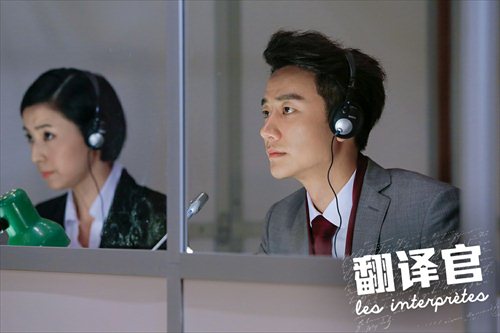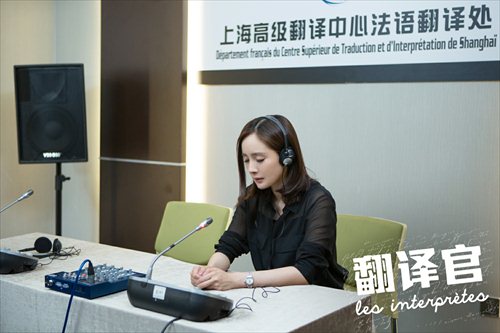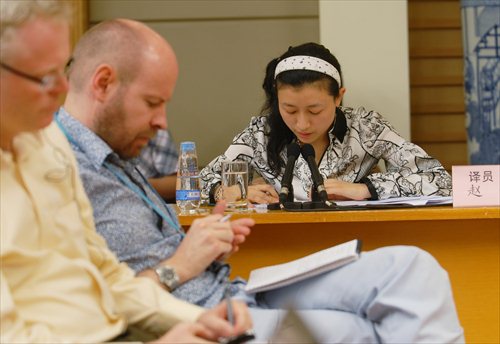HOME >> METRO SHANGHAI
New hit television series gives interpreters a controversial image
Source:Global Times Published: 2016-6-5 18:53:01

Cheng Jiayang, the tough mentor is played by Huang Xuan in the series. Photo: IC
A new Chinese television series, Les Interprètes (The Interpreters) has been smashing ratings records in China as it portrays the mysterious world of interpreters following a young newcomer to the profession and her authoritative and assertive mentor. The show first screened on May 24 and, according to dramafever.com, claimed over 10 percent of the viewers that night, a stunning five times the number who watched the second placed show.
The show stars Huang Xuan as the tough-talking mentor, Cheng Jiayang, and Yang Mi as Qiao Fei, a French language graduate who is charmed and bullied into becoming a professional interpreter.
But this series has divided viewers. While some fans see Les Interprètes as a finely produced romantic drama, others slate it because it is not true to the original best-selling novel. And professional interpreters have also taken against it, slamming it for inaccuracies and for portraying the profession misleadingly.
Loyal fan
Han Wenjuan, a second-year Master of Translation and Interpreting (MTI) student at Zhejiang Normal University, is a loyal fan of the book and has been bitterly disappointed by the televised version.
"I know that television and novels have different styles, and that plot changes are sometimes inevitable, but I just can't tolerate this show. They have turned it into an everyday romance and have lost most of the important elements from the novel," Han said. "Cheng, for example, is too overwrought in the series. In the novel, he is urbane, gentle and introverted. Though he is very strict with Qiao, Cheng never abused or yelled at her like a drama queen."
Having read the novel more than 10 times, Han said the heroine should have been a sophisticated strong-willed girl who had had a tough life but kept things to herself. "So she shouldn't be telling anyone about her poor family and how she struggled. So far in the television series she is nothing but a troublemaker. Except for the name, this Qiao is completely different from the one I loved and admired in the book."
Les Interprètes is one of Han's favorite books and was a big influence in her choice of career. "I read it first when I was a freshman and at that time, I wished I had read it in high school, for I would have definitely chosen French as my major. But since I was majoring in English and there was no French major in my school, I could only apply for the MTI course for English translation and interpretation to be like Qiao," Han told the Global Times. "That's why I am so disappointed with the television series - it's kind of ruined the book."

Qiao Fei, the French language graduate played by Chinese actress Yang Mi. Photo: IC
The show's scriptwriter, Hong Jinghui, told the news site xxcb.cn, the show had intended to pay tribute to the work of interpreters, but since it has aired complaints and criticisms have been pouring in. Many translator and interpreter students like Han complained that the show did not properly explain the profession to the viewers.
"I think a television series based on a specific profession should show the viewers what the work is really like - like the Hong Kong show Triumph in the Skies about pilots. But Les Interprètes is just a romance under the guise of interpretation. They don't show the behind-the-scene stories of interpreters, not to mention a real view of the whole industry. Instead, they try to make interpreters very mysterious," Han said.
Misleading
In the show Qiao graduated from Shanghai International Studies University (SISU) and the action is set in the fictional "Le Départment Français du Centre Supérieur de Traduction et Interprétation de Shanghai" (the Department of French of the Shanghai Advanced Center of Translation and Interpretation). On television in Chinese it is called gaofan yuan, but some critics say this is misleading because there is a real gaofan yuan at SISU, the Graduate Institute of Interpretation and Translation (GIIT), where China's elite translators and interpreters are trained.
And recently insiders, students and others connected have taken to social media to attack the far-fetched plotlines and explain how things were actually done at the university and the graduate institute.
For Han Dandan and Valentine Qiu, first-year postgraduates studying French interpretation at the institute, there have been too many ridiculous plots.
Han Dandan talked about a scene in the first episode where the hero walks into a meeting room after all the other participants and guests were seated. "Our lecturers have talked about the code of conduct and how professional interpreters are always in their places at least 30 minutes before they begin interpretation. The writers should have talked to us about the work."
And what upsets Han Dandan most is the name for the staff - Fanyi Guan (interpretation officers). "That's ridiculous! There's no title like this in reality. We interpreters are language service providers. The better we are at interpreting, the more invisible we are. These characters are too obvious and overstated to be interpreters," she said.

A Chinese interpreter translates Chinese into English for audience at a meeting. Photo: IC
Qiu, who decided to be a French interpreter after reading the book in high school, finds the series overdone. "Their training, for example, is too dramatic. Going to cocktail parties to study interpretation, reciting while counting the number of steps as they walk downstairs and teachers shouting at you when you make mistakes - none of this is real."
Kind to rookies
Han Dandan added, "Our teachers never shout at us though they are strict. A simple 'this is nonsense' said in class is enough to embarrass us. Most of the time, they are patient and kind with us."
There are other things that have annoyed the students - like the moment in episode 11 when the heroine is faster at a simultaneous interpretation than her tutor. "That's almost impossible in real life," Qiu said. "I don't know about other schools, but at GIIT, we don't have French simultaneous interpreting courses, because it's too difficult for beginners. We start with consecutive interpreting and this is also very difficult! My partner and I practice almost every day till nearly 11:00 pm. Even so, after a year of study, I still stumble over many phrases."
"In China, the usual perception of interpreters is that they are no more than highly paid groups or glorified officials who are connected to important people," Han Dandan told the Global Times. "I think people would still think this after watching the show. It doesn't show much of the hard work behind the scenes."
And Qiu has other concerns. "People might expect too much from us," she said. "Qiao does a great job but Cheng still abuses her which annoys me. People might think every interpreter is as good as this - but she is just a genius created by screenwriters! I'm afraid when people see what we actually do in real life, they will think we're useless."
But she still sees value in the way the show tells people about the work of interpreters. "The show does promote the profession and I think next year there will be a big increase in the number of students wanting to study French interpreting."
In awe
One fan, at least, agrees about viewers learning about the profession. Zou Chao, an office worker from Changzhou, Jiangsu Province, said she was now in awe of the work interpreters do. "I always knew being an interpreter wasn't easy, but I never knew it was that complicated."
In one episode Qiao gets into trouble when she accidentally touches a cup belonging to a foreign prince. "I used to think that interpreters only had to translate one language to another. But now I understand that interpreters have to be aware of so many other things, especially at diplomatic conferences," Zou said.
She is aware of the criticisms of the show but she personally finds the plots and the characters completely involving.
"For me, the interpreting is just the background for the story. I see interesting plots, vivid characters, conflicts and drama - it's great television and I'm addicted to it."
The article was written by Gu Qianwen
Newspaper headline: Really lost in translation
Posted in: Metro Shanghai, City Panorama